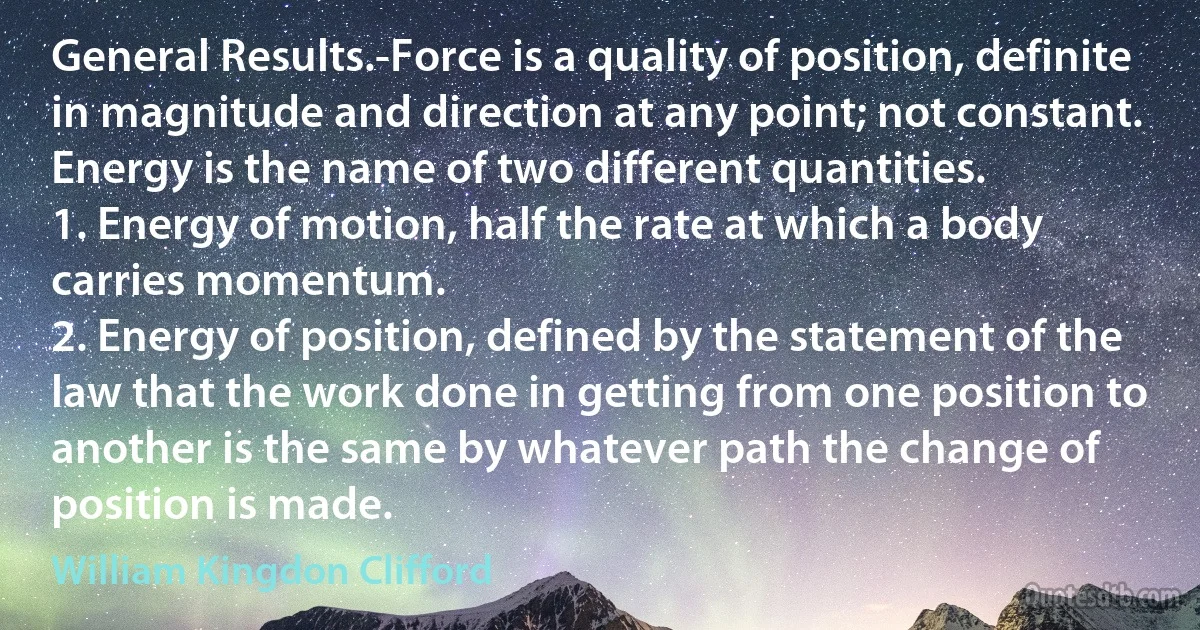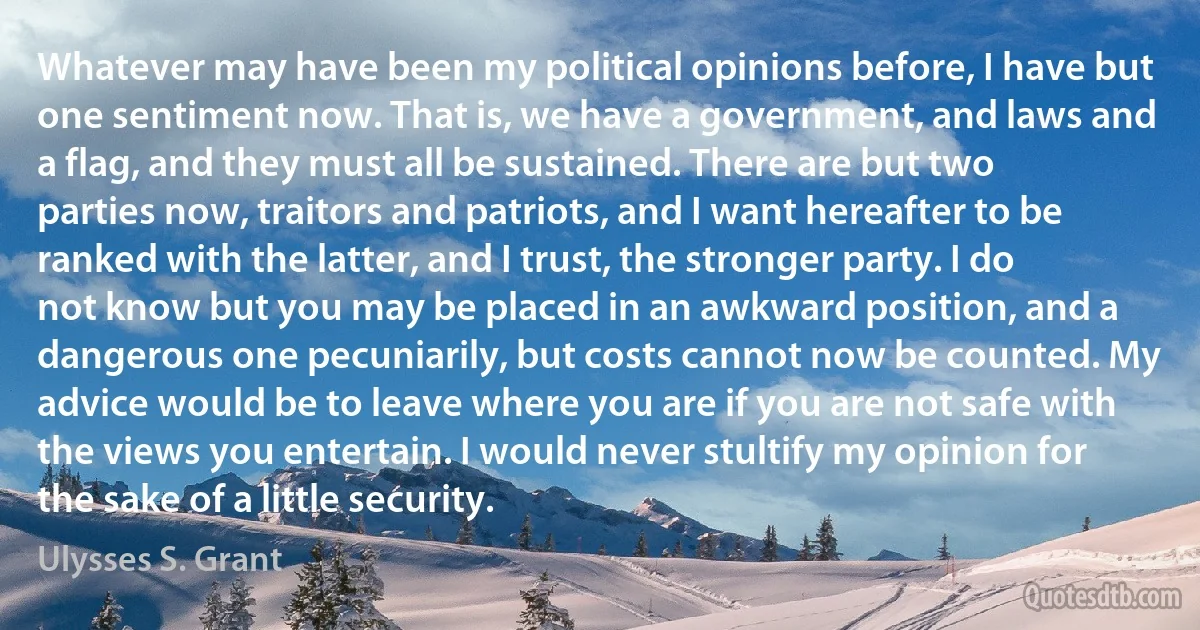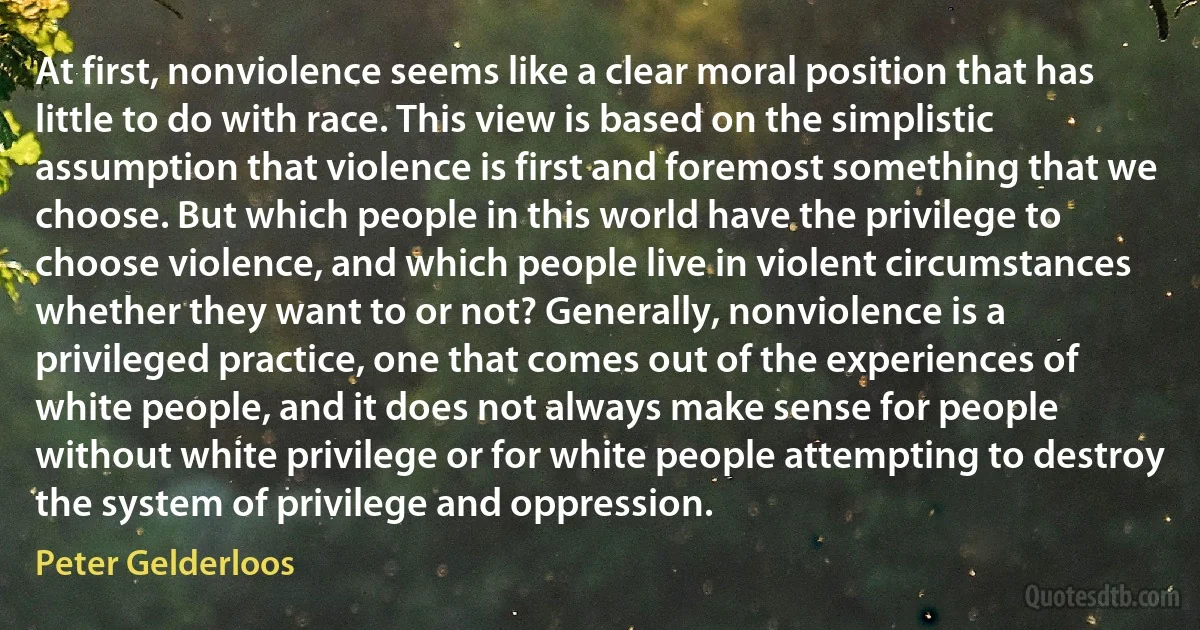Position Quotes - page 98
Our position is such that we could not 'integrate' our economy into that of Europe in any manner that would prejudice the full discharge of these other responsibilities. At the same time, Britain regarded herself as bound up in western Europe, not only in economic, strategic and political interests, but in our culture and indeed in our participation in the heritage of Christian civilization.

Stafford Cripps
In the name of Indian national life, in the name of religion, I appeal to all in each of the two countries who hold position...let them begin each in their own community to work untiringly towards this end: boldly to repudiate feelings of hatred and intolerance, actively to condemn and suppress acts of violence and aggression, earnestly to strive to exorcise suspicions...I appeal in the name of national life because communal tension is eating into it as a canker...I appeal in the name of religion because I can appeal to nothing nobler, and because religion is the language of the soul, and it is a change of soul that India needs today.

Edward Wood
If we alone, among the great Powers, gave up the competition and sank into a position of inferiority, what good should we do? None whatever-no good to ourselves because we cannot realise great ideals of social reform at home when we are holding our existence at the mercy, the caprice if you like, of another nation. That is not feasible. If we fall into a position of inferiority our self-respect is gone, and it removes that enterprise which is essential both to the material success of industry and to the carrying out of great ideals, and you fall into a state of apathy. We should cease to count for anything amongst the nations of Europe, and we should be fortunate if our liberty was left, and we did not become the conscript appendage of some stronger Power. That is a brutal way of stating the case, but it is the truth.

Edward Grey, 1st Viscount Grey of Fallodon
If France is beaten in a struggle of life and death, beaten to her knees, loses her position as a great power, becomes subordinate to the will and power of one greater than herself-consequences which I do not anticipate, because I am sure that France has the power to defend herself with all the energy and ability and patriotism which she has shown so often-still, if that were to happen and if Belgium fell under the same dominating influence, and then Holland, and then Denmark, then would not Mr. William Gladstone's words come true, that just opposite to us there would be a common interest against the unmeasured aggrandizement of any power?

Edward Grey, 1st Viscount Grey of Fallodon
In private life there are few beings more obnoxious than the man who is always loudly boasting; and if the boaster is not prepared to back up his words his position becomes absolutely contemptible. So it is with the nation. It is both foolish and undignified to indulge in undue self-glorification, and, above all, in loose-tongued denunciation of other peoples. Whenever on any point we come in contact with a foreign power, I hope that we shall always strive to speak courteously and respectfully of that foreign power.

Theodore Roosevelt
Right here let me make as vigorous a plea as I know how in favor of saying nothing that we do not mean, and of acting without hesitation up to whatever we say. A good many of you are probably acquainted with the old proverb, "Speak softly and carry a big stick - you will go far.” If a man continually blusters, if he lacks civility, a big stick will not save him from trouble, and neither will speaking softly avail, if back of the softness there does not lie strength, power. In private life there are few beings more obnoxious than the man who is always loudly boasting, and if the boaster is not prepared to back up his words, his position becomes absolutely contemptible. So it is with the nation. It is both foolish and undignified to indulge in undue self-glorification, and, above all, in loose-tongued denunciation of other peoples. Whenever on any point we come in contact with a foreign power, I hope that we shall always strive to speak courteously and respectfully of that foreign power.

Theodore Roosevelt
In every wise struggle for human betterment one of the main objects, and often the only object, has been to achieve in large measure equality of opportunity. In the struggle for this great end, nations rise from barbarism to civilization, and through it people press forward from one stage of enlightenment to the next. One of the chief factors in progress is the destruction of special privilege. The essence of any struggle for healthy liberty has always been, and must always be, to take from some one man or class of men the right to enjoy power, or wealth, or position, or immunity, which has not been earned by service to his or their fellows. That is what you fought for in the Civil War, and that is what we strive for now.

Theodore Roosevelt
One day, I was picking up dog turds on my front yard, and I realized something: there are 6 people who work for me full-time, so I'm slowly reevaluating everybody's position at Ron White Inc., so that next time, I won't have to be the dog-turd-picker-upper. It's a tie between my pool boy and my tax attorney...and I'm leaning towards the tax attorney. But as I'm picking up these turds, I see one that's massive, even by Sluggo's standards, which are legendary, and I know it's his, because he outshits the Scotties 2-to-1. I'm looking at this turd – I'm admiring it, really – and I begin to think there's lettering on the side of it. I go in the house and get my glasses, because I can't read shit without my glasses. [Audience laughs] And it does. It says "Midland Park Golf Course". Sluggo had eaten and shat whole a golf glove, velcro and all...I rinsed it off and been using it for three weeks.

Ron White
My letter [Ahmadinejad's "letter to the American people"] had different aims and goals. Many American citizens in the messages and letters they sent requested that I bring up my points of view directly. Many of them said that the government of America doesn't let them receive my point of view in its entirety and without distortions. So I talked to them directly. The behavior of the American government has severely damaged the position of the United States. No country in the world looks upon America as a friend. When the U.S. is mentioned, people are reminded of war, aggression and bloodshed, and that's not a good thing. In other words, the American people are paying for something they don't believe in.

Mahmoud Ahmadinejad
True, the law is sacred to the bourgeois, for it is his own composition, enacted with his consent, and for his benefit and protection. He knows that, even if an individual law should injure him, the whole fabric protects his interests; and more than all, the sanctity of the law, the sacredness of order as established by the active will of one part of society, and the passive acceptance of the other, is the strongest support of his social position. Because the English bourgeois finds himself reproduced in his law, as he does in his God, the policeman's truncheon which, in a certain measure, is his own club, has for him a wonderfully soothing power. But for the working-man quite otherwise! The working-man knows too well, has learned from too oft-repeated experience, that the law is a rod which the bourgeois has prepared for him; and when he is not compelled to do so, he never appeals to the law.

Friedrich Engels
Many I believe will wonder at this juxtaposition, not seeing that he is like Spinoza, or that he holds the same conspicuous position in art as Spinoza in science. Without destroying the balance of the Speech, I could only suggest my reason. There is now another reason why I should say no more. During these fifteen years the attention to Spinoza, awakened by Jacobi's writings and continued by many later influences, which was then somewhat marked, has relaxed. Novalis also has again become unknown to many. At that time, however, these examples seemed significant and important. Many coquetted in insipid poetry with religion, believing they were akin to the profound Novalis, just as there were advocates enough of the All in the One taken for followers of Spinoza who were equally distant from their original.

Baruch Spinoza
I knew years before the Pentagon Papers came out that the Americans were being lied in to an essentially hopeless war. I'm not proud of the fact that it didn't occur to me that my oath of office, which was to support the Constitution, called on me to put that information out and say, ‘64, when the war might have been avoided. But I certainly am glad that I finally came aware of what my real responsibilities were there. And I did put it out years later. At times, at that time, which published it, the "Times,” and the 18 other newspapers, which defied President Nixon's injunctions and did put it out, were in the position of Julian Assange is in now.

Julian Assange
Today I would like to thank from my heart all those of you who have trusted me, sympathized with me or in any way supported me. Without your understanding and goodwill I would not have been able to stay in office for even a few moments. I appreciate your support all the more for the fact that I did not try at all costs to obtain it. I frequently even took what was clearly a minority position and so reaped more opposition than recognition. Sometimes I may have been mistaken in this but I would like to assure you of one thing: I have always tried to abide by the dictates of the authority under which I took my oath of office - the dictates of the best of my awareness and conscience.

Václav Havel
I personally think it was valuable. I think maybe it causes the American people to take pause and say, wait a minute, if we have someone who is as selfless and as committed as Jim Mattis resigns his position, walking away from all the responsibility he feels for every service member in our forces, and he does so in a public way like that, we ought to stop and say, OK, why did he do it? We ought to ask what kind of commander in chief he had, that Jim Mattis [had], that, you know, the good Marine, felt he had to walk away.

Stanley A. McChrystal
So many black kids are put in that position, so I wanted to show that there is no one way to talk black. There is a stereotype that if you sound ghetto, and you use a lot of slang, that makes you black. I wanted to show this girl who exists in these two different worlds. Which Starr is the real Starr? There are so many adults who identify with that, too. I went through it myself when I was in college...

Angie Thomas
Well, I don't like Dreamcatcher very much. Dreamcatcher was written after the accident. [In 1999, King was hit by a van while taking a walk and left severely injured.] I was using a lot of Oxycontin for pain. And I couldn't work on a computer back then because it hurt too much to sit in that position. So I wrote the whole thing longhand. And I was pretty stoned when I wrote it, because of the Oxy, and that's another book that shows the drugs at work.

Stephen King
Nonviolence is an inherently privileged position in the modern context. Besides the fact that the typical pacifist is quite clearly white and middle class, pacifism as an ideology comes from a privileged context. It ignores that violence is already here; that violence is an unavoidable, structurally integral part of the current social hierarchy; and that it is people of color who are most affected by that violence. Pacifism assumes that white people who grew up in the suburbs with all their basic needs met can counsel oppressed people, many of whom are people of color, to suffer patiently under an inconceivably greater violence, until such time as the Great White Father is swayed by the movement's demands or the pacifists achieve that legendary "critical mass.”.

Peter Gelderloos
The Virginians are said to pride themselves upon the peculiar tenderness with which they visit the sceptre of authority on their African vassals. As all those acquainted with the character of the Virginia planters, whether American or foreigners, appear to concur in bearing testimony of their humanity, it is probable that they are entitled to the praise which they claim. But in their position, justice should be held superior to humanity; to break the chains would be more generous than to gild them; and whether we consider the interests of the master or the slave, decidedly more useful. To give liberty to a slave before he understands its value is, perhaps, rather to impose a penalty than to bestow a blessing; but it is not clear to me that the southern planters are duly exerting themselves to prepare the way for that change in the condition of their black populations which they profess to think not only desirable but inevitable.

Frances Wright
Conservatism starts from a sentiment that all mature people can readily share: the sentiment that good things are easily destroyed, but not easily created. This is especially true of the good things that come to us as collective assets: peace, freedom, law, civility, public spirit, the security of property and family life, in all of which we depend on the cooperation of others while having no means singlehandedly to obtain it. In respect of such things, the work of destruction is quick, easy, and exhilarating; the work of creation slow, laborious, and dull. That is one of the lessons of the twentieth century. It is also one reason why conservatives suffer such a disadvantage when it comes to public opinion. Their position is true but boring, that of their opponents exciting but false.

Roger Scruton
Soy boricua. In spite of my family and in spite of my country, I'm writing the process of the Puerto Rican mind- taking it out of context-as a native and a foreigner-expressing it through Spanish, Spanglish, and English-Independencia, Estado Libre Asociado, and Estadidad-from the position of a nation, a colony, and a state-Wishy, Wishy-Washy, and Washy.

Giannina Braschi



